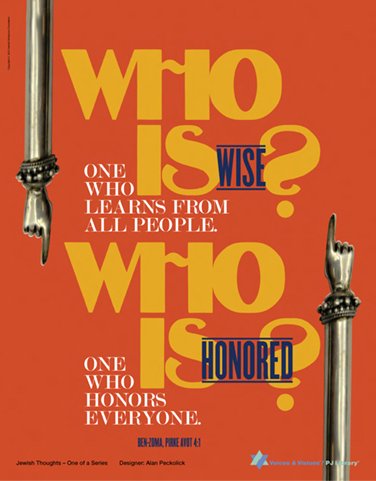
Below is a further description of a discussion triggered by a Voices & Visions poster based on a passage from Pirke Avot:
'The ancient city of Zippori unfolded before our eyes. It is located in the heart of Lower Galilee, Israel, midway between the Mediterranean and the Sea of Galilee. In this city Jewish scholars studied and compiled the Mishna (Oral law) about 1800 years ago. That day we studied the text and found it relevant to our American lives of the 21st century. Our interfaith group, which included early childhood educators and science professionals, relate to this text easily; in some ways we live by it. Both early childhood educators and scientists like to ask questions. Inquiry and curiosity are at the core of their respective fields. The discussion included the visual art by Alan Peckolick, the graphic designer and artist for Voices & Visions - a new initiative by the Grinspoon Foundation.'
Many ideas came out of our discussion:
- The place of “questions” in the education process. The Mishna Opens with the question: ‘Who is wise?’ The artist uses a large font for the question, making it in the center of attention. The question for sake of questioning is important in the process of learning. Participants of our group agreed that to question is of utmost importance; it is part of the journey of finding. The Mishna is full of questions and debates - exemplifying this important and powerful process.
- A safe learning environment. Our very diverse group in the safe environment of the pluralistic nature of Hebrew College felt very comfortable to raise “any question”. This led to deep and meaningful conversations which allowed for growth while inspiring mutual honor. At the Shoolman Graduate School of Jewish Education, as we educate educators, we emphasize the importance of safe learning. Students need to feel and know that no question is “stupid”; there is a place for all questions. With openness to question we can reach honor.
- Teacher versus student. The hand (yad) in Jewish tradition points at the Torah text. The artist chose to use the hand in a different way. It is not pointing at the text; rather, it points in two opposite directions. One is pointing up, the other down. Some interpreted it as Up for “scholars”, down for less knowledgeable. Some added that it signifies up to the sky and down to the ground, since we learn from nature. Still others pointed out that up is for G-d and down is for human beings. Sometime we look “up“ for answers and many time we find them “down”. The early childhood educators shared again and again how much they learn from the children in their schools. We all agreed that one cannot learn on their own or only with scholars, we learn from all people. We learn from the children in the classroom, master teachers, scientists, people with disabilities, and from people of different faiths and values.
- Asking questions is at the heart of Judaism. It is at the heart of early childhood education, and at the heart of scientific exploration. The wise learn from all. Pointing up and pointing down. At Zippori, while exploring ancient text that is so relevant for us today we found common ground for conversation as educators, scientists, and simply human beings exploring Israel.
To quote Irving Greenberg’s thoughts about this Mishna: 'Wisdom is a process, not an answer. The wise man knows how much he does not know. So he constantly seeks to learn new things. The wise woman has developed understanding by listening to and learning from others.'"
See more at http://hebrewcollege.edu/blog
